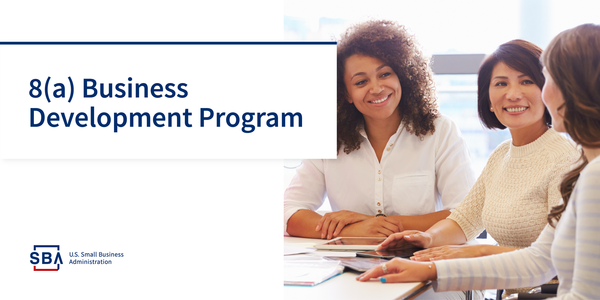Increase the Number of Disadvantaged Small Enterprises with an 8(a) Certification
OVERVIEW
The SBA 8(a) application is a critical tool for assisting socially and economically disadvantaged entrepreneurs in breaking into the American economic mainstream. Thousands of ambitious entrepreneurs have benefited from the program's assistance in gaining a foothold in government contracting.

Priority Goal is to expand the 8(a) Program by improving customer service of SBA 8(a) application and reducing administrative barriers for applicant firms. The program's expansion will provide possibilities for socially and economically disadvantaged enterprises to enter the government contracting market.
SBA's Strategic Objectives are Directly Supported by this Priority Goal:
- Ensure that federal contracting goals are met or exceeded by partnering throughout the federal government to enhance small business opportunities and strengthen the integrity of the federal contracting certification process and data.
- Ensure inclusive entrepreneurship through increasing access and opportunity for small firms and entrepreneurs in communities where market gaps still exist.
- Mitigate taxpayer risk and increase monitoring across SBA programs.
The following are the major roadblocks and challenges:
There are numerous obstacles to expanding the SBA 8(a) application and raising the overall number of 8(a) company application approvals. The SBA, on the other hand, is committed to making smart, ambitious, and customer-focused improvements to ensure that the 8(a) program is accessible to all businesses that fulfill the program's eligibility conditions. To prevent relapsing to historical trends of rejecting 50% or more of completed applications, consistent measuring of progress and monitoring of the adoption of new and streamlined procedures will be critical.
The following are some of the difficulties:
- Uncertainty over how competitors will react to the necessary regulatory adjustments that will be published in the Federal Register to relieve businesses of long-standing but unneeded constraints. Wet signatures and a 12-month waiting period to reapply after being denied by the SBA, regardless of the basis for the denial, are two instances.
- Within the Office of Business Development, there is a risk of poor staff involvement or a desire to maintain the status quo. Staff assigned to process applications operate remotely from the SBA's headquarters in Washington, DC, and have been educated in current, time-consuming methods.
The 8(a) Business Development Program also accomplished the following:
- Received General Counsel's consent to submit streamlined SBA 8(a) application forms to OMB for approval, which is currently waiting as of September 30, 2016.
- Continued to take a more customer service-oriented approach to communicate with businesses during the application approval process, rather than denying approval due to missing documents, and instead of guiding businesses through the process.
- Received General Counsel's approval to submit shortened Annual Review forms to OMB for approval, which is still waiting as of September 30, 2016.
- The updated 8(a) Program Standard Operating Procedures were approved by the Administrator.
- The number of SBA 8(a) applications that were received, authorized, and denied was kept track of.
- BOS training on regulatory and simplified modifications to the SBA 8(a) application program was conducted.
The SBA will step up its efforts to engage with federal agencies and hold them accountable for meeting their objectives.



Comments
Post a Comment